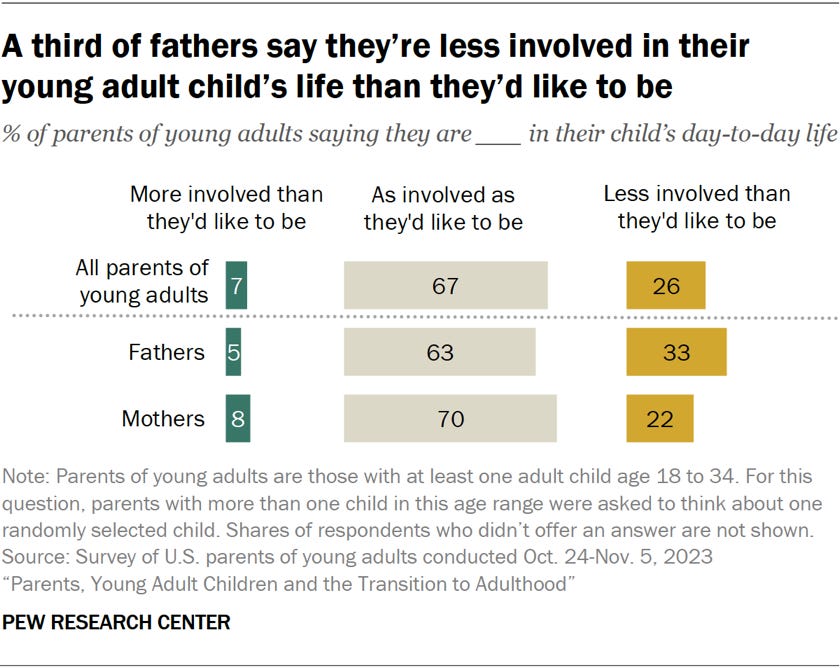Welcome to Techno Sapiens! I’m Jacqueline Nesi, a psychologist and professor at Brown University, co-founder of Tech Without Stress (@techwithoutstress), and mom of two young kids. Techno Sapiens is now home to 20,000+ readers, and I’m so grateful you’re here.
Happy Earth Day, sapiens! I hope you have a chance to get outside today, enjoy the earth, and of course, read this post on the research-backed benefits of nature to help you celebrate.
In the meantime, we’ve got a brand new research roundup. For those who are new here (welcome!), research roundups are a chance to catch up on the latest research in tech, parenting, and psychology. I get to share some of the most interesting studies I’ve come across recently, and you get some new, fun facts to pull out at your nerdiest dinner parties—and it all goes down in 5 minutes or less.
Research roundups are typically for paid subscribers only, but this one’s available to everyone. If you’d like to support the work that goes into this newsletter, and to get access to future research roundups like this one (and much more!), please consider a paid subscription.
Alright, let’s do this.
1. For God’s sake, CALL YOUR DAD.
A new nationally-representative survey investigates fathers’ emotional connectedness to their young adult children (ages 18-34), and the results hit me right in the feels. Fathers are less likely than mothers to communicate with their adult children regularly, with less than half (46%) talking to them on the phone or via video chat at least a few times a week (versus 61% of moms). More than a quarter of dads say their child does not rely on them for emotional support “much” or “at all” (28% for sons, 27% for daughters).
And worst of all? One-third of dads (33%) say they’re less involved in their child’s life than they’d like to be.
My take: I know every family situation is different, and not all of us are lucky enough to have our dads in our lives. But if the option is available to you, I want you to go ahead and stop what you’re doing. Stop reading this email. Shut your laptop. And for the love of survey data, please call your dad. Pew Research Center.
2. Some people are more sensitive to social media than others
Does social media have a negative impact on you? This study suggests it depends on how “sensitive” you are to it. Researchers at University of Texas at Austin took a sample of 1,632 college students and, in addition to some basic baseline questionnaires, had them fill out seven short surveys every day for four weeks. (Note: this is an unbelievable amount of data).
The surveys asked about whether and how long students had used social media in the past hour, where they were, who they were with, and positive and negative emotions they were feeling. On average, after using social media, people reported slightly lower well-being (e.g., loneliness, less feelings of acceptance). However, this effect varied a lot.
People who were already “psychologically vulnerable” (i.e., more depressed, less satisfied with life) reported more negative impacts of social media. People also reported more negative impacts when they used social media while in social places (e.g. parties) or in nature, and also when they were around close friends or family—rather than at home or alone. In other words, people showed greater “sensitivity” to social media’s effects depending on: (1) who they were, and (2) when and where they were using it.
My take: We often recognize that social media’s impact depends on the person using it, but not as often that within a given person, that effect differs from day-to-day and even moment-to-moment. Perhaps unsurprisingly, these results suggest that, for most people, it’s better to avoid using social media when it might interrupt mood-boosting activities, like spending time with friends and family. Nature.
3. Does social media ruin kids’ social skills?
Full disclosure: I’m an author on this study, thanks to a collaboration with a wonderful team of researchers in Trondheim, Norway. However, my husband separately came across a Tweet about it and sent it to me, not knowing I was involved (see below)—so we’ve got independent verification that it is, in fact, a very interesting study.
So: how does using social media impact kids’ social kills? Many people assume that increased time on social media will turn kids into socially awkward tech zombies who never talk to other kids face-to-face. But is that true?
For this longitudinal study, a team of very kind, smart, and welcoming Norwegian researchers surveyed over 600 adolescents every two years, from ages 10 to 18. They asked about the frequency of their social media use (how often they post, like, comment, etc.), as well as how much time they spent with friends offline. Social skills were assessed via parent report (since kids are not great at reporting on their own social skills).
So, what did we find? Three interesting results emerged (albeit, most with small effect sizes):
More time on social media actually predicted more time spent in-person with friends.
More time on social media did not predict future social skills for most kids.
However, for one group of kids—those with greater social anxiety—increased social media time did predict lower social skills at certain ages (12-16).
My take: The biggest takeaway here is that the effects of social media on social skills are not as straightforward as the “socially awkward tech zombie” hypothesis might imply. Lots of time on social media may impact social skills for certain kids (particularly those who are already struggling socially, like those with social anxiety). But, as we know, social media is not all bad. For some kids, time on social media is actually leading to more in-person connection. Computers in Human Behavior
A quick survey
What did you think of this week’s Techno Sapiens? Your feedback helps me make this better. Thanks!







I do get the idea to say I have to call my dad more often.
But also, isn't there a larger societal, gender thing here? Why is it the child's responsability? The study was conducted for 18-34 years old, if the people are still in college or something of the sort they're still for the most part under the authority of their parents.
Why don't dads call? What made them feel less involded? Did they do stuff when they were with their kids to have a connection between them that could last even when they're away (college or their own home with their own kids)? The study shows they want a better connection, cool. Do they try?
Dads, at least in the western culture I'm familiar with, have always been placed seconds in the care of their children. But also, dads don't want to take over and assume the role that the mom has in most homes.
Take a moment : how many stay at home moms do you know? How many stay at home dads? How much did your dad do at home?
It's not even really the case with my dad but lets please change the narrative : dads, CALL YOUR KIDS
Alternatively: call your children.